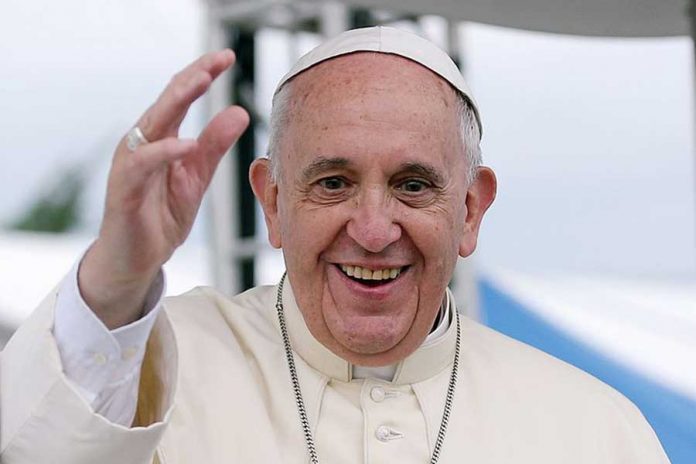In yet another step by Pope Francis toward embracing LGBTQ+ Catholics, the Vatican has announced that transgender people can be baptized within the church. The only mitigating factor is that doing so doesn’t create “public scandal or confusion among the faithful” in the place where it is done.
The statement from the Vatican’s theological watchdog group, called the Dicastery for the Doctrine of the Faith, came in response to a question from a Brazilian bishop, José Negri of Santo Amaro.
The document states unequivocally that the sacrament of Baptism has an “indelible character regardless of the state of sin of the person receiving it.”
Throughout his papacy, Pope Francis has asserted — and the document reifies — that the Church is not a “tollhouse,” meaning that baptism should not be closed to anyone.
This latest statement from the Vatican and approved by Pope Francis is another nuanced guide to inclusion in the modern Church. As PGN has reported in recent years, Pope Francis has made reaching out to LGBTQ+ Catholics a hallmark of his papacy. In this latest statement, Francis states that not only can transgender people be baptized, but they can also serve as godparents and be witnesses at church weddings. Another move toward realizing this Pope’s vision of a more inclusive Church.
Pope Francis’s approach has been to welcome LGBTQ+ people into the church, once saying “Who am I to judge?” when asked about gay couples. Just last month, PGN reported Pope Francis opened the possibility for blessing same-sex unions.
Last year, he urged parents of LGBTQ+ people to “accompany their children and not hide in an attitude of condemnation.”
The Pope’s embrace of transgender people’s participation in the church was revealed in a Vatican document that he approved on Oct. 31 and that was posted online Nov 11. These questions came before the Dicastery for the Doctrine of the Faith, in part, because official Catholic teaching, according to the Catechism of the Catholic Church, is that “same-sex sexual behavior is a grave sin” and that “homosexuality is objectively and intrinsically disordered.”
President and CEO of GLAAD Sarah Kate Ellis, the world’s leading LGBTQ+ media advocacy organization, said in a statement, “Pope Francis’ latest LGBTQ affirmation sends an unequivocal message to political and cultural leaders around the world to end their persecution and exclusion of transgender people. Pope Francis is continuing to break down barriers that have kept LGBTQ Catholics away from full participation as members of the Roman Catholic Church and is instead calling on global leaders to create welcoming spaces for LGBTQ people.”
Francis DeBernardo, the executive director of New Ways Ministry, a Maryland-based group that advocates for gay Catholics, said in a statement, “Welcoming transgender people more fully to the sacraments is a good step.”
DeBernardo said the decision “signals Pope Francis’ desire for a pastorally focused approach to LGBTQ+ issues is taking hold,” he added.
DeBernardo said, “This affirmation, itself a reversal of a previous Vatican decision, contrasts strikingly against the restrictions some U.S. bishops have imposed on LGBTQ+ people in recent years. Additionally, though the document appears to caution that people in same-gender relationships may not be suitable godparents, the new decision’s emphasis that ‘pastoral prudence’ be used on a case-by-case basis opens the possibilities for married gay people to serve in such roles.”
American bishops, who are largely conservative and many of whom have taken issue with Pope Francis’s progressive changes, were not welcoming of the change. In a statement, a spokeswoman for the United States Conference of Catholic Bishops emphasized that the question of a transgender person’s participation in the sacrament of baptism and other spiritual rituals was separate from questions of medical interventions for transgender people.
“These are different, distinct issues,” she said.
In March, the American bishops’ conference issued its own 14-page doctrinal document stating that chemical and surgical interventions for the purpose of gender transitions were “not morally justified,” and instructed Catholic hospitals not to perform them.
LGBTQ+ Catholic group DignityUSA executive director Marianne Duddy-Burke issued a statement in response to the new Vatican document saying, “It is encouraging to see the Vatican making it clear that LGBTQ+ people are not automatically banned from our church’s sacraments.”
The statement says that “too many bishops and priests have made it difficult for members of the LGBTQ+ community to receive sacraments, which are central to the lives of Catholics.” The organization “hopes this document will help with that situation.”
Commentary from the National Catholic Register suggests there will be pushback against the Papal document within conservative sectors of the Church. The commentary refers to breaking news reports about the Pope’s decision as “clickbait” from people who do not understand the Church.”
Yet despite the naysayers, Pope Francis has spoken often about making the Catholic Church more welcoming to LGBTQ+ people throughout his papacy. As PGN reported, Francis recently condemned “unjust” laws that criminalize being gay, urging bishops to welcome LGBTQ+ people into the Church, especially in countries where those draconian laws exist. LGBTQ+ advocates called that statement “historic.”
“Being homosexual isn’t a crime,” Pope Francis said during an exclusive interview on January 24 with The Associated Press. It was a declaration that, like many statements from Francis, sparked immediate controversy among his conservative detractors, but was welcomed by his supporters — including a majority of Catholics in the U.S.
DeBernardo said, “The Vatican’s more positive approach to transgender and nonbinary people as participants in the sacraments contrasts with, and even contradicts, some U.S. bishops’ approach. In recent years, several dozen dioceses have issued policies with restrictions for LGBTQ+ Catholics, including prohibiting transgender people from being baptized or serving as godparents. Such policies must now be reconsidered, and likely rescinded, given that Pope Francis and the Vatican are leading the church on a different path.”

